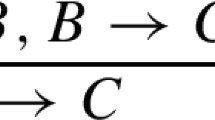Abstract
We define realizability semantics for Light Affine Logic ( \(\mathsf{LAL}\) ) which has the property that denotations of functions are polynomial time computable by construction of the model. This gives a new proof of polytime-soundness of \(\mathsf{LAL}\) which is considerably simpler than the standard proof based on proof nets and is entirely semantical in nature. The model construction uses a new instance of a resource monoid; a general method for interpreting systems based on Linear Logic introduced earlier by the authors.
Similar content being viewed by others
References
Amadio, R.M.: Max-plus quasi-interpretations. In: Proc. of the 7th International Conference on Typed Lambda Calculi and Applications. LNCS, vol. 2701, pp. 31–45. Springer, Berlin (2003)
Asperti, A., Roversi, L.: Intuitionistic light affine logic. ACM Trans. Comput. Log. 3(1), 137–175 (2002)
Barendregt, H.: The Lambda Calculus: Its Syntax and Semantics. Studies in Logic and the Foundations of Mathematics. North Holland, Amsterdam (1984)
Bellantoni, S., Niggl, K.H., Schwichtenberg, H.: Higher type recursion, ramification and polynomial time. Ann. Pure Appl. Logic 104, 17–30 (2000)
Cook, S., Urquhart, A.: Functional interpretations of feasible constructive arithmetic. Ann. Pure Appl. Logic 63(2), 103–200 (1993)
Coppola, P., Martini, S.: Typing lambda terms in elementary logic with linear constraints. In: Proc. of the 6th International Conference on Typed Lambda Calculi and Applications. LNCS, vol. 2044, pp. 76–90. Springer, Berlin (2001)
Crossley, J., Mathai, G., Seely, R.: A logical calculus for polynomial-time realizability. J. Methods Logic Comput. Sci. 3, 279–298 (1994)
Dal Lago, U., Hofmann, M.: Quantitative models and implicit complexity. In: Proc. Foundations of Software Technology and Theoretical Computer Science. LNCS, vol. 3821, pp. 189–200. Springer, Berlin (2005)
Dal Lago, U., Martini, S.: Phase semantics and decidability of elementary affine logic. Theor. Comput. Sci. 318(3), 409–433 (2004)
Dal Lago, U., Martini, S.: The weak lambda calculus as a reasonable machine. Theor. Comput. Sci. 398(1–3), 32–50 (2008)
Girard, J.-Y.: Light linear logic. Inf. Comput. 143(2), 175–204 (1998)
Girard, J.-Y., Lafont, Y., Taylor, P.: Proof and Types. Cambridge University Press, Cambridge (1987)
Hofmann, M.: Linear types and non-size-increasing polynomial time computation. In: Proc. of the 14th IEEE Syposium on Logic in Computer Science, pp. 464–473 (1999)
Hofmann, M.: Safe recursion with higher types and BCK-algebra. Ann. Pure Appl. Logic 104, 113–166 (2000)
Hofmann, M., Scott, P.: Realizability models for BLL-like languages. Theor. Comput. Sci. 318(1–2), 121–137 (2004)
Kreisel, G.: Interpretation of analysis by means of constructive functions of finite types. In: Heyting, A. (ed.) Constructivity in Mathematics, pp. 101–128. North-Holland, Amsterdam (1959)
Lafont, Y.: Soft linear logic and polynomial time. Theor. Comput. Sci. 318, 163–180 (2004)
Murawski, A.S., Ong, C.-H.L.: Discreet games, light affine logic and ptime computation. In: Proc. of 14th International Workshop on Computer Science Logic. LNCS, vol. 1862, pp. 427–441. Springer, Berlin (2000)
Roversi, L.: A P-time completeness proof for light logics. In: Proc. of 13th International Workshop on Computer Science Logic. LNCS, vol. 1683, pp. 469–483. Springer, Berlin (1999)
van Emde Boas, P.: Machine models and simulation. In: Handbook of Theoretical Computer Science. Algorithms and Complexity, vol. A, pp. 1–66. MIT Press, Cambridge (1990)
Wadsworth, C.: Some unusual λ-calculus numeral systems. In: Seldin, J.P., Hindley, J.R. (eds.) To H.B. Curry: Essays on Combinatory Logic, Lambda Calculus and Formalism. Academic Press, San Diego (1980)
Author information
Authors and Affiliations
Corresponding author
Rights and permissions
About this article
Cite this article
Dal Lago, U., Hofmann, M. A Semantic Proof of Polytime Soundness of Light Affine Logic. Theory Comput Syst 46, 673–689 (2010). https://doi.org/10.1007/s00224-009-9210-x
Received:
Accepted:
Published:
Issue Date:
DOI: https://doi.org/10.1007/s00224-009-9210-x




